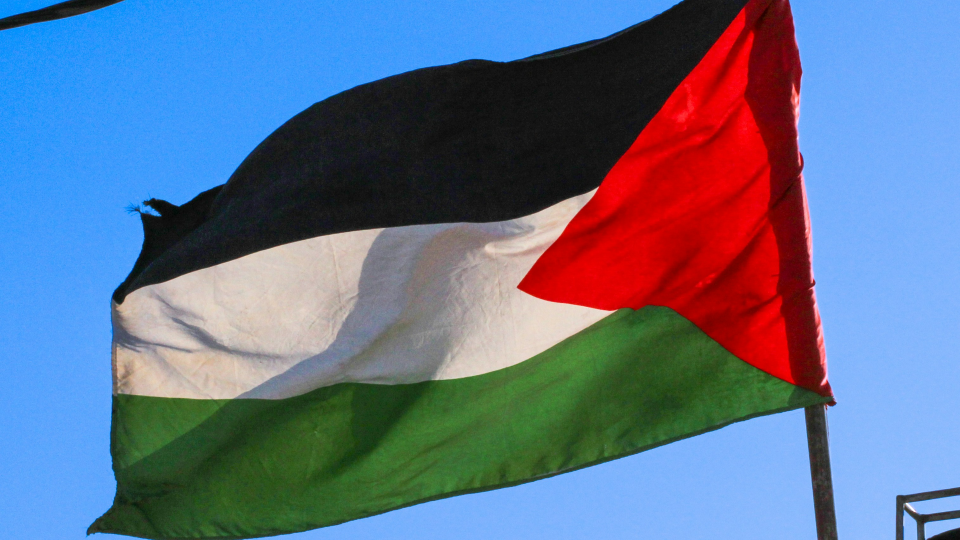Last week’s announcement that the Israeli Government intends a full – if indefinite – occupation of the Gaza Strip, and this morning’s assassination of a man who was at minimum a Hamas-sympathising Al Jazeera employee, came despite the presence, just a week earlier, of a highly visible sign held up during the medal ceremony of the All-Ireland final:

I have thought a lot, since I saw that sign, about what its holder must have been thinking. Did he or she imagine, genuinely, that Prime Minister Netanyahu would be sitting in his office in Jerusalem, enjoying Kerry versus Donegal, and would come to an appropriate conclusion? I will not do the sign-holder the disservice of imagining that the answer to that question is “yes”.
No, the audience for that sign was other Irish people, not a single one of whom can do a solitary thing to “let the aid in”.
I think the sign was more a form of religious expression and cultural identity than a call to action. Or at minimum, the expression of a kind of competitive empathy (“I care more than you”) that is driving a section of the population to insanity.
Ireland has been, for nearly two years now, in the grip of Palestinianism. Palestinianism in Ireland might be defined as the belief that the inhabitants of the Gaza strip and West Bank, respectively, are our brother patriots, fighting colonial oppression as our own ancestors so nobly did, and that to identify with them is not only a matter of moral sympathy but a sort of core expression of Irish national identity. This is not a controversial statement, but the official position of activists like Kneecap, who openly state it.
For example there was, to my knowledge, no sign held up in Croke Park imploring the entry of aid to South Sudan, where hundreds of thousands of people also face starvation and where delivering the aid is an altogether easier job.
Thus, an obvious deduction can be made: The idea of people starving is not by itself what animates the Irish Palestinianist. There needs also to be an intoxicating moral component, and this is provided by the idea that the Israeli actions in Gaza constitute a unique and unprecedented evil, even as several Ukrainian cities lie in ruins on their own continent from indiscriminate artillery shelling. Even as the aforementioned South Sudanese see their children slaughtered with Machetes instead of bombs. Nor did or does the Palestinianist lose much sleep about events in Syria, which take place only a few dozen kilometers away from Gaza itself and where millions – literal millions – are dead or displaced.
What’s more, the fascinating thing about Irish Palestinianism is that it is a purely rhetorical affair. Concrete actions that might actually persuade either side (who are we kidding – that might persuade Israel) are unavailable. Pressure from the Government or the public on Hamas to release the hostages and end the war is functionally non-existent. The entire business is about expressing moral outrage at Israel – not about ending the war.
If that sign at Croke Park had simply been a blank sheet reading “Irish people are more moral than the Israelis” it might have conveyed its own sentiments more accurately.
If it was simply about ending the war, then there is certainly more that the Irish Government could have done. It could for example have issued Irish passports in the name of every Israeli hostage, making them all Irish citizens and saying that the Government of Gaza was solely responsible for their welfare. Even had that not deterred Hamas from holding them, it might at least have bought the Irish Government a kinder and more welcoming ear in Jerusalem.
From a purely tactical perspective, a country with no “hard” power can only exercise influence on those who consider it their friends or consider that it has their best interests at heart. No Israeli could imagine for a second that Ireland has its best interests at heart. Why would they listen to a country that quite overtly mulls it’s very right to exist? Israel does not always listen to its friends, but it listens to them a damn sight more often than it listens to its enemies.
In any case this is to misunderstand the point. Ending the war is not the end goal of Palestinianism. Ending Israel, or at least Israel as currently constituted, is the end goal. This is the official policy position of parties representing about a third of Dáil Eireann. The end of the current war would not satisfy that hunger. And since Israel’s dismantling cannot ever be accomplished diplomatically, it is a little bit cheap to hold that view and call yourself “anti-war”.
Last week, when I was on holiday, 19 US Congresspeople sought to have Ireland added to a list of nations subject to US sanctions because of economic boycotts against Israel. The boycott in question, the occupied territories bill, has not yet even passed. In a recent opinion poll, the Sunday Independent found a majority of Irish people in favour of passing it even if to pass it was to cause severe economic repercussions for Ireland. This is even as the backers of that bill admit that it will have no economic impact at all on the Israelis and is almost entirely symbolic.
Looking at the country from the outside, this is all very strange. The average Palestinianist sincerely believes that the Irish position makes us appear more moral on the global stage. That our expressions of horror alone are a mark of goodness, even as those expressions accomplish nothing to actually alleviate a day’s suffering for a single Palestinian.
A section of the country is in the grip of a kind of toxic Palestinianism. It has entered a kind of desperate virtue-signaling loop where words alone can no longer sufficiently express the outrage, and actions are unavailable or impractical. And thus, the populace has done what desperate people caught up in a mental health crisis sometimes tragically do: It has – according to the Sunday Independent’s poll – embraced the notion of self-harm. Perhaps if Ireland fully alienates its own allies, offends the Americans, condemns the Europeans, and generally acts frantically against its own self-interest, the world might notice our self-harm and decide to relent. The whole thing has, when you think about it, echoes of the Hunger Strikes. Self-harm as protest. (Economic) suicide as political strategy. That Palestinianism predominantly emerges from the same hard-left nationalist political stable as that kind of lost-cause romanticism is no coincidence. Last year, an American serviceman self-immolated in the cause of Palestine. Ireland can do the same economically if it wishes, but to the same net effect.
But the reality here is simple: Bibi Netanyahu did not watch the All-Ireland final. And his standing in Washington – and frankly, Brussels – is higher than ours. On its own terms, Ireland’s toxic Palestinianism is an extraordinary failure. For both us, and for the civilians of Gaza.

